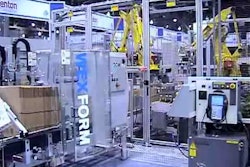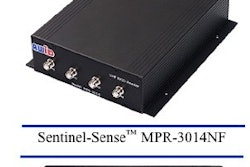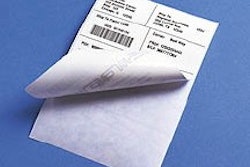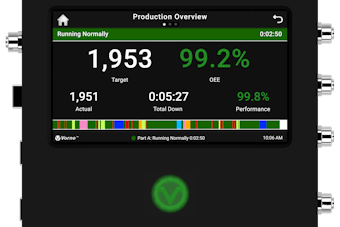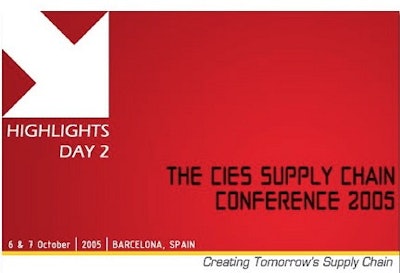
The CIES Supply Chain Conference 2005, meeting October 6-7 in Barcelona, Spain, offers RFID insights from some of the world's most prominent food businesses on both the packager and retailer sides.
A million RFID tags weekly for Marks & Spencer “Far from being a trial, RFID is now a reality at M&S,” argued Ian Mumby, head of the company's supply chain & Logistics & IT–Foods. The UK retailer’s RFID program now involves six distribution centers and more than 100 supplier sites that handle 1 million tags a week.
Lessons learned include that tags are resistant and readable, and readers have become cheaper and more flexible—particularly the mobile readers adopted in 2004. A key factor has been the progress made with suppliers.
Marks & Spencer is now working with 105 suppliers, most of whom have moved from being neutral about RFID to being active; the retailer now considers the majority of suppliers, accounting for 80% of chilled product volumes, to be “committed” or “enthusiastic”.
Regarding supplier compliance, Mumby noted that the issue is not so much read rates as write rates—how effectively suppliers write data to tags.
In terms of benefits, Mumby stressed that the major benefits will not occur in the DC, but at the supplier and store ends, with more accurate outbound tracking and improved availability.
Over the next few months, Marks & Spencer will process more chilled foods with RFID tags than with barcodes, marking the point where “the tag will be king”. He offered three conclusions: RFID works in an operating environment; suppliers will invest once they understand; and RFID is delivering real value for M&S now.
Kraft and Wegmans push data synch choreography “Data synchronization is all about choreography”, explained Dave Hutchings, Kraft Foods senior director business to business. The Global Data Synchronization Network (GDSN) aims to connect all data users, just as the telecoms industry connects customers on different networks. For Kraft, part of the rationale behind synchronizing data is the potential business savings; for example, every invoice error costs it $400 on average, while the equivalent of 3.5% of sales are lost through inaccurate data.
But eliminating inefficiencies represent only the near-term benefits of data synchronization (data synch): the long-term benefits lie in collaboration in functions such as promotions and product development.
Today, data synch is about aligning basic item specifications, whereas in the future this will move to areas like price and RFID. When Kraft started its RFID program it realized how bad its data was; but it has now synchronized data for 37% of products for United States customers.
However, data synch is proving more challenging in Europe, explained Jochen Rackebrandt, director customer service at Kraft Foods Germany, explained. Multiple country-specific and language-specific attributes together with limited commitment from retailers, suppliers and GS1 country organizations provide hurdles, Rackebrandt said.
Marianne Timmons, director business to business, Wegmans Food Markets, described data synch as part of the any-to-any connectivity enabled by internet. Ten years ago, the U.S. retailer formed a cross-functional team to see what changes the Internet could bring. The company’s e-commerce vision places data synch and data accuracy as foundational elements in an evolution leading to supply chain visibility.
Wegmans has now completed its data synch program, with suppliers representing 54% of volume and is aiming to increase this to 70% by the end of 2005 and over 90% in 2006. Timmons also gave an update on the Joint Business Planning Group, which comprises a number of retailers and suppliers, including Kraft and Wegmans. The group is aiming for a global data quality solution in order to support GDSN.
Nestle's do-it-yourself approach to RFID at Metro Antonia Wanner, head of purchasing with Nestle Germany, and Philip Barnes, supply chain development director Europe, SCA Packaging, described a pilot of RFID tags on pallets and cases for delivery to Metro in Germany. Nestle has been conducting the pilot with Metro at pallet level since November 2004, extending this to case level in the first quarter of 2005.
The challenge was: to ensure that the tags and the data matched; to have fast and 100%-reliable reading of tags; to have an efficient one-stage process for embedding chips in the packaging; and finally add value to the supply chain by improving service for Metro. A major technical issue was readability, especially given the speed at which forklift trucks passed through RFID gates. Nestle developed a solution for pallets, “The Flag Tag”, which is 100% readable. This illustrates the fact that complete technical solutions do not exist: you have to do a lot of technical development yourself, Nestle's Wanner insisted.
SCA Packaging's Barnes summarized the process for embedding chips in the packaging. At the moment, 80% of SCA's RFID-enabled cases are produced off the main production line. The precision of tag application is currently +/- 10 mm (0.4"), while the reject rate is 7%. SCA is trying to improve these results, but will need a jump in technology in order to improve readability for cases with liquid and metal content.
In summary, Wanner stressed the importance of progressing step by step from pallet to case level. Overall, companies have to look at the whole process that encompasses a combination of the physical flow of goods and the digital exchange of data.
About CIES
CIES-The Food Business Forum is the only independent global food business network. It serves the CEOs and senior management of 175 retailer and 175 supplier member companies, and their subsidiaries, in more than 150 countries. It is headquartered in Paris, and operates regional offices in Washington DC, Singapore, and Tokyo.

